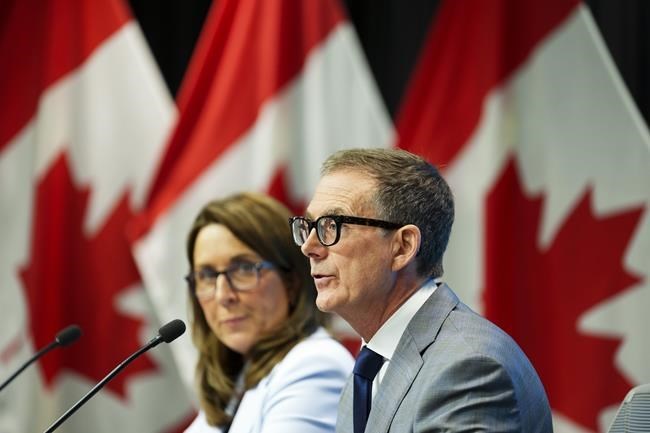OTTAWA — The Bank of Canada hiked its key interest rate on Wednesday, by 0.25 of a percentage point to five per cent.
Governor Tiff Macklem says inflationary pressures aren’t easing as quickly as the central bank wants, and more rate hikes could be coming if the economic data supports it.
Here’s what we learned from the Bank of Canada’s decision and monetary policy report, and remarks from Macklem and senior deputy governor Carolyn Rogers as they spoke to reporters after the announcement.
Recession likely not in the cards
The Bank of Canada doesn’t expect a recession, despite the squeeze higher rates are putting on the economy, Macklem said.
The central bank expects economic growth to average around one per cent for the next year before picking up after that.
“We need a period of growth below trend, below potential, to let supply catch up with demand. That's what's going to relieve those price pressures,” Macklem said.
“But we do think that there's a path back to price stability, while with the economy still growing.”
Two per cent inflation is still far away
The central bank doesn’t see inflation reaching its target of two per cent until the middle of 2025.
Macklem said he expects the consumer price index, which measures inflation to grow at around three per cent for the next year before gradually declining to target.
“This is about six months later than we expected in April,” he said.
Don’t expect rate cuts any time soon
Interest rates may get even higher if the data supports it, but they’re not getting lower in the near future, Macklem said.
“It's clearly too early to be talking about interest rate cuts,” he said.
“We are certainly trying to balance the risks of over- and under-tightening and we'll be taking it one meeting at a time.”
Population growth is both hurting and helping inflation
Canada’s rapidly growing population, which recently surpassed a milestone at 40 million, is contributing to inflationary pressure with spending and housing demand, Macklem said.
That’s despite the fact that newcomers to Canada are also helping ease tightness in the labour market.
“Rapid population growth is contributing to both supply and demand in the economy,” Macklem said. “Newcomers to Canada are entering the labour force, easing labour shortages, but at the same time they add to consumer spending and the demand for housing.”
Pandemic savings are still flowing
While Macklem acknowledged that higher interest rates are likely hurting many Canadian households, he said spending is still strong, especially on services, and that’s contributing to stubborn inflation.
One potential reason for this is that the savings Canadians built up during the pandemic are helping buoy spending despite rate hikes, he said.
“Some households have cut back on spending because inflation and higher interest rates have eaten into their budgets, and some are being severely squeezed,” said Macklem.
“But for many, larger savings may be acting as a buffer and supporting consumer spending.”
The central bank is in a balancing act
The Bank of Canada is concerned that if it doesn’t act strongly enough now, Canadians will pay the price later, said Macklem.
“The downward momentum in inflation is waning, and we are concerned that if we're not careful, the progress to price stability could stall,” he said.
If the economy sees any upward surprises, inflation could even move back up, warned Macklem.
“We're trying to balance the risks of under and over tightening,” he said.
“We know that if we don't do enough now, we'll likely have to do even more later. We also know, though, that if we do more than we need now, it's going to be unnecessarily painful.”
This report by The Canadian Press was first published July 12, 2023.
The Canadian Press



